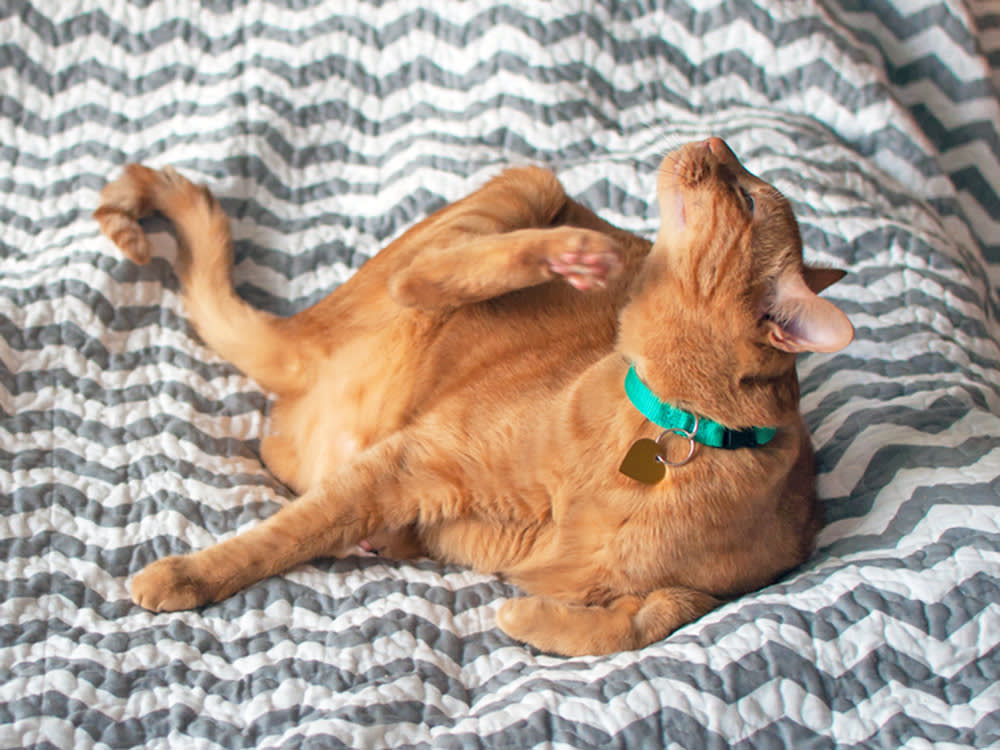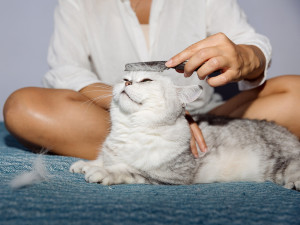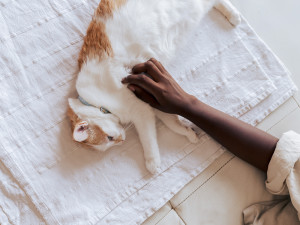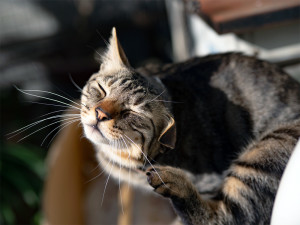How Do You Soothe Your Cat’s Itchy Skin?
Your miserable kitty would like to know, too.
In This Article:
How To Relieve Cat’s Itchy Skin Common Causes of Itchy Skin in Cats Treating Itchy Skin on Cats Frequently Asked Questions
If your kitty is itchy, you are probably tired of watching them endlessly scratch and scratch — it just looks so uncomfortable. Soothing your cat’s itchy skin involves identifying the underlying cause and providing appropriate relief. From simple home remedies like oatmeal baths to diet adjustments and medical treatments, several approaches can help alleviate your cat’s discomfort and promote healthier skin.
How to relieve a cat’s itchy skin
Skin problems in cats come in many forms, but the ones that cause itchy skin are the most likely to be an endless nuisance to both kitties and their parents. Your cat just wants to sleep, play, and eat all day. They don’t want their normal activities disrupted by the constant need to scratch their irritated skin. You don’t want to be kept up all night by the thump, thump, thump of your cat scratching their ears or the schlorp, schlorp from grooming an itchy area on their belly.
Itchy cats need relief, and getting your veterinarian involved early can help prevent bigger problems down the road. Don’t waste time wondering, “Why is my cat itchy and scabby?” Instead, focus on getting them relief by identifying the root cause of the problem. There are prescriptions and home remedies available for itchy cats, but you need to treat the correct problem in order to soothe your cat’s itchiness.
How much do you spend on your pet per year?
Common causes of itchy skin in cats
Flea infestations
Fleas are one of the most common causes of itchy skin in cats. The movement of the fleas alone makes cats want to lick to get rid of them. In addition to causing direct discomfort, fleas can also trigger an allergic response that really ramps up your cat’s itchiness. Many cats are allergic to flea saliva, so even a single flea bite can result in massive skin irritation.
Getting rid of fleas on your cat and in their environment is the first step in providing relief. If you and your vet find no evidence of fleas, finding out why your cat is so itchy without fleas is the next step.
Ringworm
Ringworm is caused by a fungus, most commonly Microsporum canis, and is most commonly seen in kittens. Lesions from ringworm feature hair loss, broken hairs, and crusting of skin. Cats with ringworm tend to be itchy, though this isn’t evident in all affected cats. Persian cats seem to be more likely than other cat breeds to be affected by ringworm.
Mange
Mange is diagnosed in cats very rarely in the United States, but cats can get mange from two different mange mites: Notoedres cati and Sarcoptes scabiei. Both mites can cause intense itching, as well as skin crusts and small bald areas. Transmission to people is possible with either mite, with mange due to Sarcoptes (also called scabies) being a much bigger worry for people. Fortunately, Notoedres is much more common in cats.
Allergies
Allergic skin disease in cats is another common cause of itchiness and can be one of the most frustrating to deal with. Cats can be allergic to almost anything, making tracking down the exact trigger for their skin allergies a challenge. Some common causes of allergies in cats include:
Foods
Fleas
Dust mites
Mold spores
Insects
Pollen
Getting to the bottom of allergic skin disease may involve trials of hypoallergenic food, serum allergy testing, or intradermal skin testing with a veterinary dermatologist. Some allergies are seasonal, and wax and wane throughout the year based on environmental factors.
Skin infections
Skin infections can make a cat itch like crazy. A superficial skin infection can make your cat miserable, regardless of the cause. Most cat skin infections are caused by an overgrowth of bacteria or yeast that are part of the skin’s normal flora. These organisms overgrow when the skin’s normal barriers and immune function break down. Allergies can weaken the skin’s natural defense mechanisms, so keeping allergies under control helps prevent skin infections as well.
Treating itchy skin on cats
Figuring out what to put on a cat’s itchy skin to give them relief quickly becomes a priority after watching them be unable to rest due to constant scratching. Diagnosing the cause of a cat’s itchiness is key to effective treatment. At-home treatments can fail to produce results if they’re not targeting the correct problem. Some common treatments for itchy skin in cats include:
Flea medications
There are many flea control products available for cats. Your veterinarian can help advise you on which should work best for long-term control for your itchy cat. Always be cautious when administering flea products to your cat, especially if you have dogs in the house or are purchasing an over-the-counter product. Many dog and cat flea medications look similar but have different ingredients. Cats can be very sensitive to insecticides in dog flea products and develop a dangerous toxicosis.
For flea bites on kittens, treatment may be a little different. Most flea products are not approved for use in kittens less than two pounds or eight weeks old. For small kittens, careful flea combing and judicious use of soapy water can remove fleas. Don’t forget to talk to your vet about flea treatment for the environment and other pets in the house. Getting rid of a flea infestation takes more than a day.
Bathing
As much as your cat may hate it, giving them a bath is often part of the treatment for their itchy skin. Choosing the right shampoo is vital to effective bathing. If you’re going to go through the trouble (and possible pain) of washing your cat, you might as well do it correctly. If you’re using an over-the-counter shampoo, get one made for cats, ideally containing oatmeal. Human skin has a different pH, so using a human shampoo on a cat can actually dry out their skin and make their itching worse.
If your vet has diagnosed your cat with a skin infection, they may prescribe a medicated shampoo to help keep the infection under control. Be sure to follow the instructions on the label or provided by your veterinarian. Almost all medicated shampoos require a contact time of at least ten minutes to be effective, so be sure to load up an audiobook or podcast to keep you entertained while you keep your sudsy cat in the bathtub.
Medications
Your veterinarian may prescribe different medications depending on the cause of your cat’s itchiness. Antibiotics may help to control severe skin infections. Drugs to help regulate the immune system and reduce inflammation are very effective for cats with allergies. A short course of steroids can help to reduce the inflammation that causes itchiness quickly.
Although steroids are great at providing itch relief, vets try to limit their use (especially long-term) due to concerns about the development of side effects. Steroids can unmask problems like diabetes or heart disease. They also cause thinning of skin, weight gain, muscle loss, and slow wound healing. Your vet may try other drugs like cyclosporine (Atopica) or oclacitinib (Apoquel, which is not yet approved for use in cats) to help control cat allergy symptoms.
Antihistamines
Antihistamines like diphenhydramine (Benadryl), chlorpheniramine (Chlor-Trimeton), loratadine (Claritin), and cetirizine (Zyrtec) have all been tried for controlling acute itchiness in cats. There hasn’t been great evidence that they provide cats with much relief though. Scratching may be reduced in acute flare-ups due to drowsiness caused by the medications. Antihistamines may provide some support for control of allergies long-term, but they are not commonly used as the primary medication for treatment.
Topical treatments
Mange and ringworm are often treated with topical therapies, including shampoos and medicated dips. Some of these treatments may be done at your vet’s office because they require specific dilution and proper ventilation when they’re applied. This also helps keep you from looking like a big meanie in your cat’s eyes.
If you’re looking for a cat skin infection home remedy, avoid over-the-counter creams and ointments unless they’re recommended by your veterinarian. Cats are amazing contortionists and can groom a topical ointment off of almost any part of their body. Some of these ointments contain ingredients that can cause problems ranging from stomach upset to zinc toxicity.
Dietary changes
Cats with food allergies will usually need to switch diets. This may be a diet featuring protein and carbohydrate sources that are new to your cat or a hydrolyzed diet made with proteins broken down small enough that the immune system doesn’t react to them. Diet trials for food allergies can be tough. Your cat has to eat only the new food for one to two months to see if it has an impact on their itchiness. Any deviation can re-trigger allergies and start the whole process over again.
Supplements
Your vet may recommend some dietary supplements for your itchy cat. The most common dietary supplements for skin problems in cats contain omega-3 fatty acids. These oils don’t help much with acute flare-ups of itchy, irritated skin, but they can help with overall skin health as part of a long-term treatment plan. There are many over-the-counter supplements available for skin health in cats. Talk to your vet about which one is most likely to help give your itchy cat some much-needed relief.
FAQs (People also ask):
Why does my cat have dandruff?
Dry, flaky skin in cats can show up due to allergies, parasites, endocrine diseases, or other issues. Dandruff in cats is not harmful by itself, but it could indicate an underlying problem that merits investigation.
Can you give cats Benadryl?
Benadryl is a commonly used anti-allergy medication for people, and it can have some of the same effects for cats. Cats can receive Benadryl under the guidance of a veterinarian to treat certain conditions.
How to get rid of fleas on cats?
Flea control takes more than a single application of medication. Cats with fleas (and their housemates) need to be treated monthly with medication, avoid future exposure by staying indoors, and have environmental control started.












